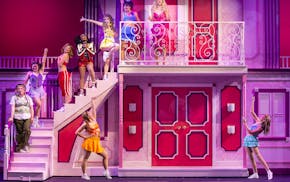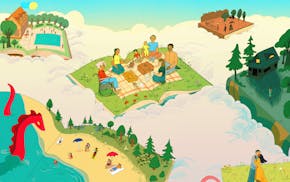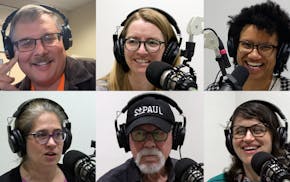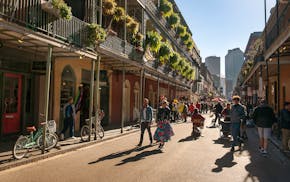As a second grader, I won honorable mention in a creative writing contest with a solemn, ink-blotted story about the Crucifixion. My prize was a crate of children's classics, among them "Little House in the Big Woods," "English Folk and Fairy Tales" and a richly illustrated "Pinocchio." These works formed the nucleus of a collection that continues to expand like the universe (to my wife's chagrin), constellations of science, literature and scholarly histories.
Critic Sarah Chihaya probes our obsession with books — why they sustain us, how they perhaps cage us, if there can be too many — in her stylish, if uneven, memoir-cum-essays, "Bibliophobia." It recounts a 2019 mental crisis that pushed her to examine her life.
Chihaya opens in medias res: she's been hospitalized in Manhattan, frazzled, her capacity to read — her identity — severely compromised. From this narrative linchpin, she unspools her struggles with depression, including three suicide attempts, and the weird space she occupied as a Japanese Canadian who had moved to suburban Cleveland, shoehorned into a kind of cultural estrangement.
"Nervous breakdown was not for the children of immigrants," she observes. "It was something that happened to white people in independent films or in middle-brow realist novels. Breakdown was what happened when their gorgeous shells became so brittle and delicate they could be shattered with the slightest tap of the back of a spoon. ... Breakdown is the final frontier of assimilation."
Books helped her to assimilate by allowing her to dissolve, like molecules of air, amid their characters and plots. Her first passion was the "Anne of Green Gables" series, set in the Canadian Maritime provinces, followed by Toni Morrison's "The Bluest Eye," a work she calls the "Life Ruiner."
Chihaya astounds when she sticks close to the texts that molded her. Each chapter features titles that have jolted her from complacency: A.S. Byatt's "Possession," Helen DeWitt's "The Last Samurai" and Ruth Ozeki's "A Tale for the Time Being." They were lifelines, tossed during low points.
She riffs on systemic racism, family frictions, even an abandoned Green Gables-inspired theme park in Hokkaido. And yet Chihaya draws her focus inward, as if these authors are scaffolds for her own dramas of selfhood. "I felt like I was the only person in the world who really loved books," she asserts. Memo to Chihaya: You are not alone.
That insistence on "centering" herself dilutes the impact of "Bibliophobia." Her twinning of depression and the act of reading is often spot-on, but there's too much of it, too many names dropped for the sake of showing off. The effect is tedious, which Chihaya seems to acknowledge: "I'm losing track of what I'm supposed to be doing here. ... [Depression] usually does not have a clearly fixed beginning or ending; it's mostly just terrible, boring middle after terrible, boring middle."
Quibble aside, "Bibliophobia" speaks eloquently to a primal need, with perspicacious insights throughout and an urgent message about suicide, underscoring that it's a clinical condition that requires interventions by health care professionals. Chihaya cites memoirs by William Styron and Donald Antrim, which advocate for de-stigmatization and compassion, giving "Bibliophobia" the emotional oomph it seeks.
As she suggests, it matters less how many books we display on our shelves, and more what we do with their contents.
Hamilton Cain, who also reviews for the New York Times Book Review and Washington Post, lives in Brooklyn, New York.
Bibliophobia: A Memoir
By: Sarah Chihaya.
Publisher: Random House, 214 pages, $29.

For 'Legally Blonde' star, 'being underestimated is her secret superpower'

Restaurant openings and closings in the Twin Cities

24 terrific books for the beach, cabin or lawn chair you'll want to read this summer

Worth It podcast: Prince week, a giant pencil, pool parties and women's sports

